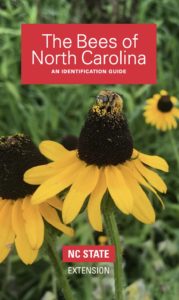NC State Pollinator Insect Resources Online
go.ncsu.edu/readext?692802
en Español / em Português
El inglés es el idioma de control de esta página. En la medida en que haya algún conflicto entre la traducción al inglés y la traducción, el inglés prevalece.
Al hacer clic en el enlace de traducción se activa un servicio de traducción gratuito para convertir la página al español. Al igual que con cualquier traducción por Internet, la conversión no es sensible al contexto y puede que no traduzca el texto en su significado original. NC State Extension no garantiza la exactitud del texto traducido. Por favor, tenga en cuenta que algunas aplicaciones y/o servicios pueden no funcionar como se espera cuando se traducen.
Português
Inglês é o idioma de controle desta página. Na medida que haja algum conflito entre o texto original em Inglês e a tradução, o Inglês prevalece.
Ao clicar no link de tradução, um serviço gratuito de tradução será ativado para converter a página para o Português. Como em qualquer tradução pela internet, a conversão não é sensivel ao contexto e pode não ocorrer a tradução para o significado orginal. O serviço de Extensão da Carolina do Norte (NC State Extension) não garante a exatidão do texto traduzido. Por favor, observe que algumas funções ou serviços podem não funcionar como esperado após a tradução.
English
English is the controlling language of this page. To the extent there is any conflict between the English text and the translation, English controls.
Clicking on the translation link activates a free translation service to convert the page to Spanish. As with any Internet translation, the conversion is not context-sensitive and may not translate the text to its original meaning. NC State Extension does not guarantee the accuracy of the translated text. Please note that some applications and/or services may not function as expected when translated.
Collapse ▲Butterflies, bees, and green lacewings are just a few of the insects that benefit humans. Using the following web resources from NC State University, you will learn how to identify pollinating insects in the landscape and vegetable garden. You will learn which plants feed, shelter, and provide habitat for pollinating insects, including how to build a pollinator house! Pesticide use can harm beneficial insects so it is important to learn how to minimize pesticide use and how to control bad insects with non-pesticide techniques.
Minimizing the Impacts of Pesticides on Pollinators slide presentation
Pollinator Conservation on Small Farms
Top 25 Pollinator Plants for NC
Landscaping for Wildlife with Native Plants
Organic Insecticides pages 26-33
NC State Videos:





